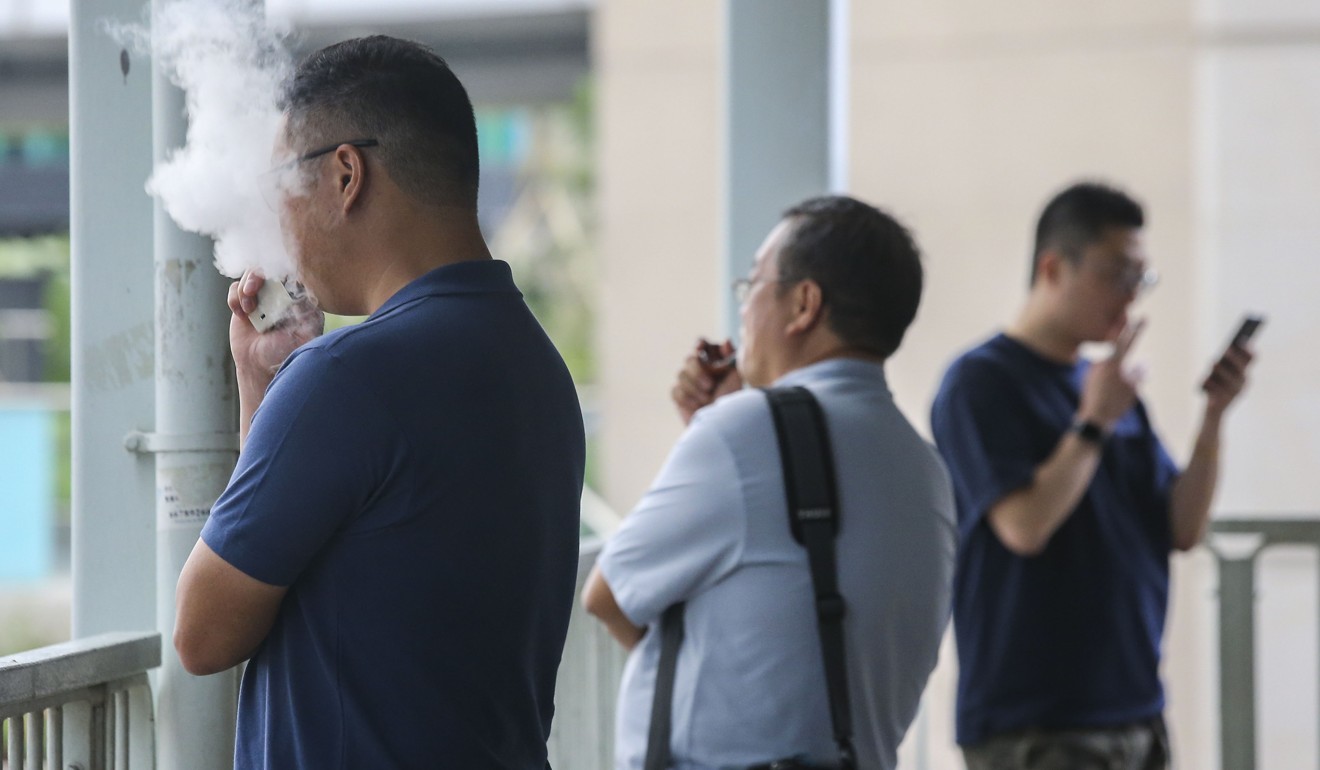
Officials ‘plugging loopholes’ in proposed Hong Kong ban on e-cigarettes, as industry vows opposition
Source says legislation will not target possession of products, meaning consumers can still use previously bought items

Officials are exploring ways to plug possible loopholes and close off access to e-cigarettes or new smoking products – especially for young people – following an announcement by Hong Kong’s leader of a proposed ban on such items.
On Wednesday, tobacco industry players and consumers expressed disappointment and vowed to oppose the ban raised by Chief Executive Carrie Lam Cheng Yuet-ngor.
Lam’s suggestion, among a series of health care initiatives announced in her second policy address, marked a U-turn from an earlier proposal aimed at regulating the products in the same manner as conventional cigarettes.
The ban on the import, manufacture, sale, distribution and advertisement of e-cigarettes and other new smoking products was to protect the health of Hongkongers, particularly children and teenagers, Lam stressed.
In her policy address report, Lam stated there was also “a lack of sufficient evidence to prove the products can help quit smoking”. The report further said “the public may underestimate the harmful effects of these products”. A government source said the city’s leader settled on a full ban as there was strong public opinion over the issue.

At present, there are no laws prohibiting the import or use of e-cigarettes and other new smoking products in Hong Kong. Consumers can also buy small quantities of the items from elsewhere and bring them into the city for self-use.
“We are worried this may be a loophole [even after the ban comes into effect],” another government source said, adding that authorities were looking into the matter and aimed to submit a proposal to the Legislative Council in the current legislative term.
But the law, if passed, would not ban possession of such products, meaning in designated areas users could still consume items that were previously bought, the source said.
Tobacco industry members however said the government’s decision was unfortunate and some vowed to oppose the ban.
“We will resist till the end. The resistance is not for ourselves, but for all Hongkongers,” said Joe Lo, convenor of a group that supports the use of heat-not-burn products, adding he felt angry with the government’s proposal.
We will resist till the end. The resistance is not for ourselves, but for all Hongkongers
“The government has ignored scientific evidence and social problems brought about by a total ban,” Lo added, pointing to the reversal of an earlier, “balanced” decision to allow and regulate the novel products in line with international practice.
He said his group had not decided on their next course of action to show their dissatisfaction.
The Asian Vape Association, which consists of around 20 local e-cigarettes businesses and organisations, said they were up in arms over what they called an unfair decision, criticising the government for forcing a quit-or-die approach on smokers.
Nav Lalji, chairman of the association, said the initiative will only encourage people to smoke traditional cigarettes.
If the legislation is enacted, the industry is expected to take a hit, with shops closing overnight while the products surfacing on the black market, according to Lalji.
Tobacco giant Philip Morris Asia, which sells conventional cigarettes as well as heat-not-burn products, said it was an unfortunate move.
A company spokeswoman said she believed the concerns over youth access to the products could be addressed through proper regulation and education.
The government first floated the idea of a total ban on e-cigarettes in 2015, and intended to submit a legislative proposal in 2016/2017. But the move was held back based on studies by related departments.
A plan, aimed at regulating items in a same manner as conventional tobacco products, was raised by authorities in June this year. But it failed to impress parties from both sides – the tobacco industry argued the proposal was too harsh on innovative products, while health experts said the rules were too lax on what were considered harmful goods.
The Hong Kong Council on Smoking and Health, an anti-smoking group, said on Wednesday it welcomed the administration’s drive to safeguard public health.
“We have been pushing for this since 2015 and we are glad to see that the government has finally come to realise the urgency,” a spokesman said.
We have been pushing for this since 2015 and we are glad to see that the government has finally come to realise the urgency
In a press release, the group urged authorities to enact the legislation with no further delay.
“We press for immediate review because new smoking products will only continue to emerge with time,” the spokesman added.
The Academy of Medicine, a specialists’ training institute in the city, expressed satisfaction with the latest policy, noting it was the result of the medical community’s push to oppose e-cigarettes and other new smoking products over the past few months.
“The academy reiterates that it is utterly wrong to say that electronic smoking devices are less addictive and pose less threat to one’s health than traditional cigarettes,” it said in a statement.
The academy added that to combat misconceptions about such products, “a complete ban on e-cigarettes is the only way to go”.
Other health care measures announced by Lam in her policy address included a free human papillomavirus (HPV) vaccination scheme for schoolgirls in Primary Five and Six, who are usually aged 10 or 11. The move is part of the fight against cervical cancer, the seventh most common cancer among local women in 2015.
Another plan centred on public hospitals allowing parents in a miscarriage to claim a fetus under 24 weeks for burial or cremation. Lam said authorities are also looking into providing facilities to handle such matters. Currently a miscarried fetus under the 24-week gestation mark is considered an abortus and disposed of as medical waste.
Additional reporting by Gary Cheung